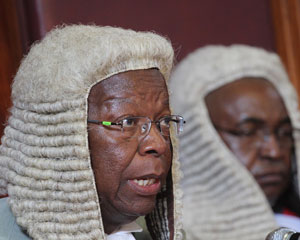
The Judicial Service Commission (JSC) will on Tuesday sit to conduct public interviews for High Court and Labour Court judges nominated for appointment to fill three vacancies on the Supreme Court bench.
BY CHARLES LAITON
The move is expected to increase the number of judges in the highest court of the land to 12 and help to deal with case backlogs.
For the first time in Zimbabwe, the interviews, scheduled to be held at a local hotel, will be conducted publicly in line with section 180 of the new constitution.
Media representatives and members of the public are entitled to attend and observe the proceedings.
The JSC said in a statement that nominations of the prospective judges were received from President Robert Mugabe and members of the public.
The 10 candidates who will be vying for the three posts are, Justices Chinembiri Bhunu, Charles Hungwe, Samuel Kudya, Euna Makamure, Lavender Makoni, Nicholas Mathonsi, Susan Mavangira, Mercy Moya-Matshanga, Tendai Uchena and Happias Zhou.
However, it is also apparent from the composition of the JSC panel set to conduct the interviews that there are three vacant posts within the commission itself. But the said vacancies according to the JSC do not preclude it from acting validly, as long as what it does is done by members who form a quorum, which is seven.
- Chamisa under fire over US$120K donation
- Mavhunga puts DeMbare into Chibuku quarterfinals
- Pension funds bet on Cabora Bassa oilfields
- Councils defy govt fire tender directive
Keep Reading
The vacant panellists are the Attorney General, who is yet to be appointed by the Head of State, Law professor/senior lecturer designated by university law teachers and one person experienced in human resources management.
The interviews will be conducted by the JSC headed by the Chief Justice Godfrey Chidyausiku, his deputy Justice Luke Malaba, High Court Judge President George Chiweshe, Chief Magistrate Mishrod Guvamombe, chairperson of the Civil Service Commission Mariyawanda Nzuwah, one judge nominated by judges, three legal practitioners designated by the Law Society of Zimbabwe, Lloyd Mhishi, Priscilla Madzonga and Josphat Tshuma and an accountant designated by Public Accountants and Auditors Board, Priscilla Mutembwa.
Previously Mugabe in consultation with the Ministry of Justice used to have the sole prerogative of appointing judges.
Some members of the legal fraternity are of the view that the new system could embarrass judges who would not have made it to the appellate court.
“It is very embarrassing to interview judges in public. You can imagine how one would feel in the event that they are asked questions and fail to answer them properly in public. The press will also be there and they will make a field day of the honourable judges,” said a Harare lawyer on condition of anonymity.
But, Zimbabwe Lawyers for Human Rights (ZLHR) chairperson Beatrice Mtetwa said there was nothing peculiar with the holding of public interviews for the prospective Supreme Court judges since the process was being done in line with the new constitution.
Mtetwa said it was interesting to note that all the nominated judges had track records and nobody would challenge their suitability to the new post.
“The interviews are going to be conducted in line with the new constitution. Although it is the first time to be done in this country, I think everything is going to be done very well. The same process happens in South Africa and many other countries and in our case, it is interesting to note that all the nominated judges have track-records,” Mtetwa said.
“These are people known to us and they make our life easier when deciding on who to choose because even members of the public know who they are.”










